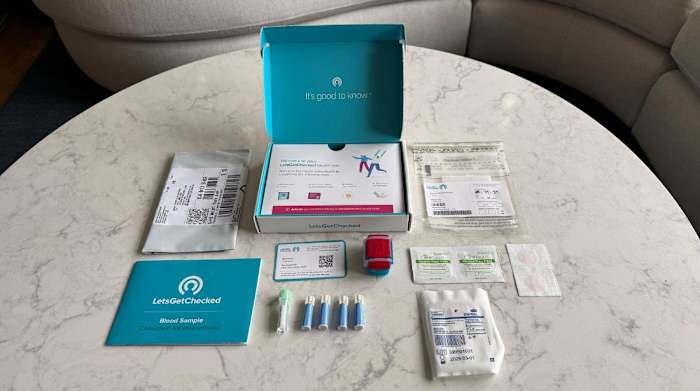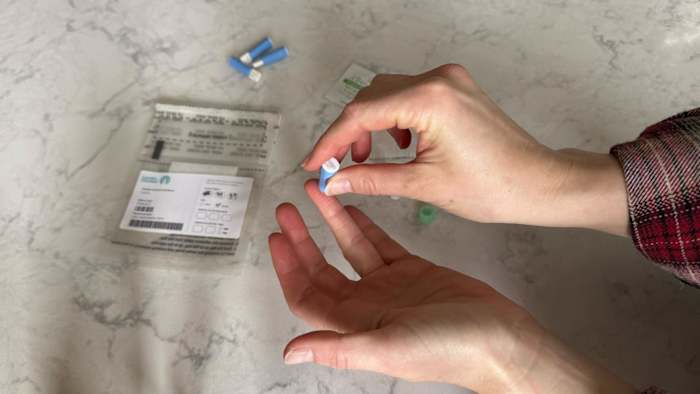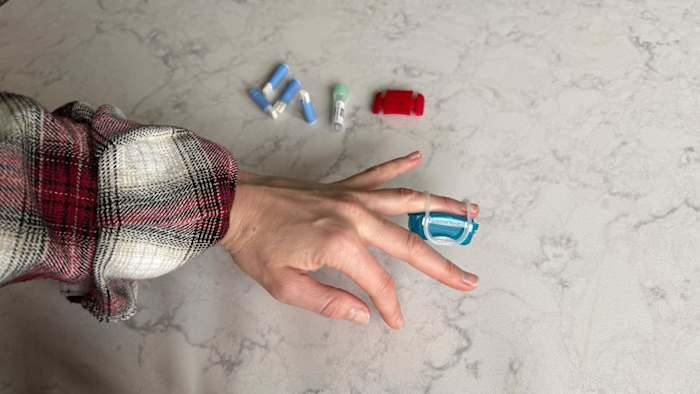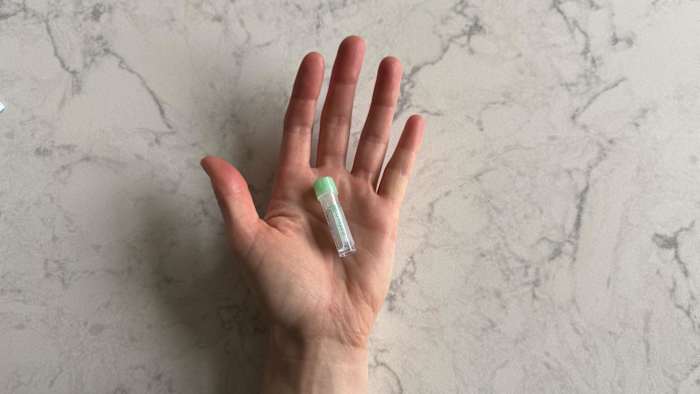The products featured in this article have been independently reviewed. When you buy something through the retail links on this page, we may earn commission at no cost to you, the reader. Sports Illustrated editorial staff are not involved in the creation of this content. Learn more here.
Whether you’ve been diagnosed with high cholesterol or you have a family history of heart disease, checking your cholesterol at home can offer peace of mind and motivate you to you seek out treatment options in the event of abnormal test results.
The LetsGetChecked Cholesterol Test is an affordable at-home cholesterol test that measures biomarkers such as low-density lipoprotein (LDL) and high-density (HDL) cholesterol, triglycerides and more via a simple finger prick blood sample.
While your body needs HDL (known as “good”) cholesterol to help remove other forms of cholesterol from the blood and circulate them to the liver, too much LDL (known as “bad”) cholesterol, can narrow your arteries and put you at increased risk for heart disease.
We tried the LetsGetChecked Home Cholesterol Test to better understand the testing process, sample collection, results and follow-up care options. Our LetsGetChecked Cholesterol Test review includes our experience, how the test works, what to expect while taking it and how to interpret your results.
This test is not a substitute for professional medical advice. These tests are not meant to diagnose any conditions. Discuss any test results with your healthcare provider. If you are experiencing negative physical symptoms, see a doctor as soon as possible.
LetsGetCheck Cholesterol Test at a Glance
- Price: $89
- Time from sample received to results: 2–5 days
- Covered by insurance: No
- HSA/FSA accepted: Yes
- Tests for: Triglycerides, total cholesterol, HDL, LDL and HDL percent of total cholesterol and lipoprotein
- Sample type: Finger prick
- Follow up care: Virtual consultation with a healthcare provider for an additional $39, which includes prescription medication sent to your pharmacy for suitable candidates
How the LetsGetChecked Cholesterol Test Works
The LetsGetChecked Cholesterol Test is one of numerous health tests offered by LetsGetChecked, a leading at-home test company that sells tests for a variety of health conditions, including thyroid, sexual health, ovarian reserve and more. Each kit includes everything you need to collect a sample and mail it out to a lab for processing.
To get started with every LetsGetChecked test, you’ll can order the test from the company’s website. You will receive a sample collection kit, mailed in discreet packaging, that includes instructions, lancets for a finger prick, a blood collection tube and a sterile package to place your blood collection tube in and mail to a LetsGetChecked lab.
LetsGetChecked partners with ISO- and CLIA-certified labs, which are the same labs used by medical professionals and hospitals. Once at the lab, your sample will be processed, and test results will be available to view in your secure online account within two to five days. Results will state if your tested biomarkers are low, normal or high.
For an additional $39, LetsGetChecked also offers the option for a consultation with a member of its clinical team of healthcare professionals. You can discuss your blood test results, and if you’re a candidate, receive a prescription for cholesterol medication to be sent to your local pharmacy.
What It Tests For
The LetsGetChecked Cholesterol Test measures several cholesterol biomarkers that can impact your risk of developing cardiovascular disease. Here’s what you can expect to see on your lab tests and why each biomarker matters.
- Triglycerides: Triglycerides are a type of fat found in your blood that come from foods we eat. Cleveland Clinic estimates that about 25 percent of people in the U.S. have high triglycerides, which can put you at increased risk for heart disease. A normal triglyceride level for adults is below 150.
- HDL cholesterol: Healthy HDL levels can help increase your protection against heart attack and stroke. An ideal HDL level is 60 or above.
- LDL cholesterol: This type of ”bad” cholesterol contributes to plaque buildup in your arteries, which can lead to heart disease. It’s also directly linked to high blood pressure. LDL levels for adults 20 and older should be below 100.
- Total cholesterol: Total cholesterol is the total amount of cholesterol that’s in your blood. This number is calculated by adding your HDL and LDL levels, plus 20 percent of your triglyceride level. A total cholesterol under 200 is most desirable.
- HDL percent of total cholesterol and lipoprotein: This biomarker checks your total cholesterol-to-HDL ratio, which should ideally be below five-to-one. Basically, it calculates how much “good” cholesterol is on your body compared to total cholesterol.
Interpreting Your LetsGetChecked Cholesterol Results
Your LetsGetChecked Cholesterol Test results will be fairly straightforward. You’ll get a result of “low,“ “normal“ or “high” for each biomarker, as well as the actual measurement. You can then schedule a virtual telehealth consultation with a LetsGetChecked provider.
If results indicate high levels of LDL cholesterol, you can expect aftercare from a medical professional that may include a combination of medication and/or lifestyle changes to lower your cholesterol, according to Scott Keatley, RD, CDN.
“The initial aftercare step often involves dietary modifications, such as incorporating foods that are low in trans fats while increasing intake of high-fiber prebiotic foods, such as fruits, vegetables and whole grains,” he says. “Regular physical activity is also crucial, aiming for at least 150 minutes of moderate exercise per week. Weight management and quitting smoking are other key aspects.”
You also may be prescribed to start medication to help manage cholesterol levels, but it’s important to confirm your at at-home test results with your primary care doctor before starting any new medication.
“If you're at higher risk for cardiac events or lifestyle changes aren’t sufficient, medications such as statins may be prescribed to help lower cholesterol levels,” Keatley says.“Statins prevent the creation of cholesterol in the liver. Other medications like ezetimibe might also be considered. Ezetimibe prevents cholesterol from being reabsorbed in the intestines.”
Related Post: The Best Diets for Heart Health
My Experience With the LetsGetChecked Cholesterol Test
We tried LetsGetChecked Cholesterol Test for ourselves to get a feel for the sample collection process and what to expect.
Ordering, shipping and delivery
Before trying LetsGetChecked Cholesterol Test, our product tester, Rachael Harris, had previously tried only one other mail-in test, but was curious to see where her cholesterol levels stood.
“My husband and I eat a lot of red meat, so I wanted to check our cholesterol levels,” she explains.
Overall, she says ordering was a breeze, and registering and creating an account was “super clear and easy.” It took four days for her test kit to arrive after ordering.
Collecting the sample
“Once I received the test and registered my test number, the instructions on the website and the printed instructions in the kit were very easy to follow,” Harris said. “The website also has a five-minute video that shows you how to safely collect your sample, package it and mail it to the lab.”
Despite clear instructions and an overall easy-to-follow kit, collecting the sample itself wasn’t a pleasant process for Harris. She describes it as “very uncomfortable” and something she wouldn’t want to do again. “I’m not normally scared of needles or having my blood drawn, but it was really hard to prick my own finger,” she says. “It hurts because it’s not just a needle prick; the prick comes from a tiny lancet that leaves a small vertical cut.”
Harris also struggled to fill the vial with blood on time before the blood on her finger clotted. “I had to prick my finger three times to fill the vial,” she says.
The phlebitic assistant (a small device that helps increase blood flow to the finger) helped Harris a little, especially because this test has to be taken in a fasted state besides water.
She was left with a small bruise on the tip of her finger the next day due to numerous pokes. For a better finger prick, Harris recommends drinking lots of water to stay hydrated.
Customer service
While Harris didn’t need to reach out to customer service, she knows several people who did and had an overall positive experience with LetsGetChecked support. LetsGetChecked customer service can be reached by phone at 315-508-7414 or via their online contact form.
Interpreting my results
Cholesterol test results arrived within the two to five days the company promises—in Harris’s case, it took three days. While her results were easy to interpret, she ultimately prefers having her cholesterol tested by her doctor due to the risk of user error.
“Cholesterol is one of those important health markers I’d prefer to have tested and to go over with my doctor,” she says. Nonetheless, she would recommend the LetsGetChecked Cholesterol Test to a friend if it was doctor-recommended and the friend didn’t have trouble with finger pricks.
What we like about the Cholesterol Test:
- Easy to register and create an account
- Clear instructions for sample collection process
- Quick turnaround time for test results
- Tests various cholesterol biomarkers
- Accepts FSA and HSA cards for payment
What to consider:
- Doctor consultation with next steps has an additional cost
- May be tough to get enough blood in one finger prick
- Test isn’t covered by health insurance
Who Should Consider a Cholesterol Test
In most healthy adults, cholesterol levels should be checked every four to six years, according to the Centers for Disease Control (CDC). However, some people may want to test more frequently due to health concerns or to simply keep an eye on their cholesterol. Here’s who might benefit from taking a cholesterol test, according to Keatley:
- People with a family history of heart disease
- People with possible symptoms of heart disease, like high blood pressure
- People who smoke
- People who have diabetes
- People who are overweight
- People on cholesterol-lowering medications (to monitor their effectiveness)
Related Post: The 5 Best Blood Pressure Watches
Symptoms of Irregular Cholesterol Levels
Your cholesterol may be abnormal due to a number of causes, including being overweight, a lack of exercise or other health conditions. It’s possible to have either abnormally high or low cholesterol, which can potentially come with telltale signs. Typically, high cholesterol isn’t noticeable and usually has no symptoms.
A blood test is the best and most accurate way to check for irregular cholesterol levels. There are a few possible signs you can look out for that may point to a cholesterol imbalance.
Low Cholesterol:
High Cholesterol:
When To See a Doctor
If your at-home cholesterol test shows abnormal test results, it’s a good idea to speak to a healthcare provider in-person. You may require further testing, and additional blood work at your doctor’s office can confirm the accuracy of at-home test results. Your doctor will also likely check other health markers, such as your blood pressure, since cardiovascular health is linked to cholesterol.
While high cholesterol typically doesn’t have symptoms, anyone exhibiting the few potential warning signs of low or high cholesterol we have listed above, as well as people with a family history of heart disease, may want to see a doctor. Your primary care doctor may suggest routine cholesterol screening to catch any potential red flags early on.
Related Post: The Best Heart Rate Monitors for Cycling, Running and More
LetsGetChecked Cholesterol Test FAQs
What is the most accurate test for cholesterol?
A blood test with a lipid profile is the most accurate way to test cholesterol and offers the most information, according to the Office of Disease Prevention and Health Promotion.
What is considered dangerously high cholesterol?
Cholesterol levels are considered dangerous if your total cholesterol is 240 or higher, your LDL is 160 or higher and your HDL is under 40 for men or under 50 for women.
Who is an at-home cholesterol test not suitable for?
If you struggle with finger pricks or blood samples, you may want to steer clear of at-home cholesterol tests. People with known high cholesterol levels should have their cholesterol monitored by a healthcare professional rather than testing at home.
Takeaway: Is the LetsGetChecked Cholesterol Worth It?
If you’re curious about your cholesterol level or have a family history of heart disease, a LetsGetChecked Cholesterol Test can be worth it to help monitor your heart health in-between doctor visits. Still, if you’ve been diagnosed with high cholesterol, you should be assessed by a doctor who understands your personal health history and can work with you on a treatment and management plan.
Prices are accurate and items in stock as of publish time.
These statements have not been evaluated by the Food and Drug Administration. These products are not intended to diagnose, treat, cure, or prevent any diseases.












